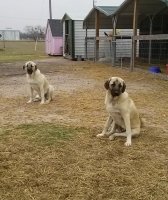TexasJacobs
Exploring the pasture
Hi everyone!
I desperately need advice about our Anatolians and chickens!
We have two 7 month old Anatolian shepherd puppies and are training them to guard our livestock and chickens. Their names are Joshua and Caleb and they are both unneutered. However, we are having problems with Joshua and the chickens--he wont stop killing them. The first time he killed a hen was at 3 months old and I think it was an accident, but since that time he has continued to kill chickens any time he has a chance.
I have read a ton about training LGDs (lots from BYH!) and have used several training techniques like:
taking him in the coop when I feed the hens and, if he attempts to chase a chicken, rolling him on his back and telling him "NO...leave it!"
I also have held our hens in front of him and (if he acts too interested) telling him "My bird...leave it!".
The pups are never allowed to roam unsupervised with the chickens except today one of our bantam hens escaped from the run and we later found Joshua over her body.
So my questions are: Since he is only 7 months old will he outgrow this behavior? And would neutering him help?
Thanks for any advice or info ya'll have!
Besides the chicken killing the pups are AWESOME dogs and we would really like to work them through this issue.
I desperately need advice about our Anatolians and chickens!
We have two 7 month old Anatolian shepherd puppies and are training them to guard our livestock and chickens. Their names are Joshua and Caleb and they are both unneutered. However, we are having problems with Joshua and the chickens--he wont stop killing them. The first time he killed a hen was at 3 months old and I think it was an accident, but since that time he has continued to kill chickens any time he has a chance.
I have read a ton about training LGDs (lots from BYH!) and have used several training techniques like:
taking him in the coop when I feed the hens and, if he attempts to chase a chicken, rolling him on his back and telling him "NO...leave it!"
I also have held our hens in front of him and (if he acts too interested) telling him "My bird...leave it!".
The pups are never allowed to roam unsupervised with the chickens except today one of our bantam hens escaped from the run and we later found Joshua over her body.
So my questions are: Since he is only 7 months old will he outgrow this behavior? And would neutering him help?
Thanks for any advice or info ya'll have!
Besides the chicken killing the pups are AWESOME dogs and we would really like to work them through this issue.


 If that was what it took to get her in the run, ignoring the chicks, she could've eaten it all! I let her in the run almost daily to eat the feed and slowly, as the chicks grew, she accepted them. I have pictures of them following her around the yard, so cute.
If that was what it took to get her in the run, ignoring the chicks, she could've eaten it all! I let her in the run almost daily to eat the feed and slowly, as the chicks grew, she accepted them. I have pictures of them following her around the yard, so cute.